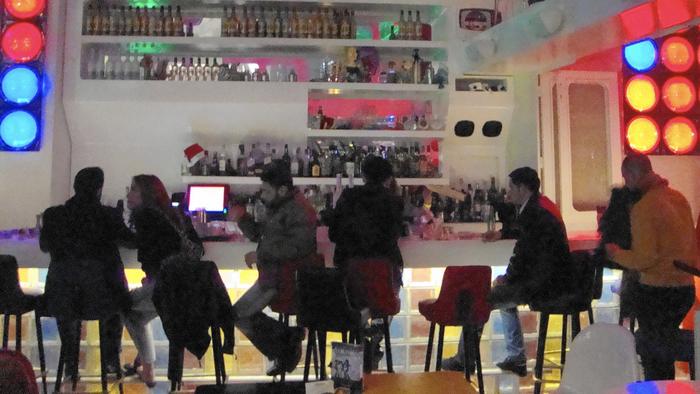‘s well after 1 a.m. at Walkman, a new 1980s-themed bar off busy Hamra Street, and the liquor is still flowing, dance floor lights still flashing, girls in tight jeans and leopard-print tops still jumping to the remixed chorus of a far more contemporary song by the Swedish DJ Avicii, "Wake me up when it’s all over."
"We want to escape from society and politics," said Mike Kaspian, 22, who works at a fabric store and was practically pulsing with energy. "So we are having fun!"
Kaspian sports a shaved head, wide grin and blue V-neck T-shirt that exposes the tribal tattoo ringing his right bicep. Tonight, he and his friends were not worrying about the ongoing unrest in neighboring Iraq and Syria, embattled Lebanese cities to the north or the spate of car bombs in town last year.
They had been doing shots of ouzo. And tequila. Maybe later they would peruse the drinks menu displayed in 1980s VHS cases — "Police Academy II," "Rambo III," "Pumping Iron" — and try some of the house specials: the Dirty Harry, Chuck Norris and Ghostbusters.
There are no references at Walkman to the Lebanese civil war that erupted in 1975 and lasted for more than a decade. It ended in 1990, two years before Kaspian was born.
If he didn’t want to think about it on a recent Thursday, he was not alone.
"People come here to forget," said Walkman’s manager, Mohammad Berro. "Tomorrow it will be fully booked."
Hamra Street is by no means what it was before the civil war: Beirut’s Champs-Elysees. But it remains one of the city’s thriving commercial thoroughfares, a magnet for tourists and students from nearby American University of Beirut, home to Caribou Coffee, Radio Shack, H&M and GNC with its brightly lit English marquee, "Live well."
Manager Berro, 30, who’s married with a 2-year-old daughter, owns a perfume shop near Hamra Street, where he works during the day — he can’t yet afford to rent on the street itself.
Walkman is on another Hamra offshoot known as the Alleyway, one of a string of small clubs and pubs.
Berro used to work at BO18, a legendary Beirut nightclub whose name also derives from the 1980s. It’s located in another haunted neighborhood — Karantina, Arabic for quarantine, where foreign workers were screened and refugees later displaced. BO18 offers bottle service, a retractable roof and parties well past dawn, as do clubs in tony Rue Monot, Ashrafiyeh and Gemmayzeh.
Berro figures that thriving night life should mean something to outsiders.
The news says we have a war here, we’re killing each other — it’s not true. And it’s not all of Syria and Iraq," Berro said as he smoked a Marlboro and stood surveying the closing-time crowd with his slicked black hair, black hipster parka and matching vintage Nikes.
But observing the same scene, Samir Moharam saw something quite different.
"Appearances can be deceiving," he said.
Moharam, 49, one of the few gray hairs in the bar, studied civil engineering at American University of Beirut and later earned his master’s degree at George Washington University.
He remembers the toll the civil war took on his hometown, which he says is still struggling economically. Only a small percentage of the population can afford to dance the night away, he said — Moharam recently lost his job as general manager of a construction company just as his daughter prepares to head off to Harvard. Even Berro acknowledged that most of those he knows work two jobs just to survive.
Moharam noted that as of 2014, a quarter of the population is composed of refugees from Syria, some working in the hipster bars next door, their children selling wilted roses to bar patrons stumbling home on Hamra Street
"I’ve seen fire and I’ve seen rain. I’ve seen the civil war, the recovery, the decadence — will things change?" Moharam said.
He looked grim.
"For the worse. You have Islamic State," he said, referring to the Sunni militant group fighting in Iraq and Syria.
But to Kaspian, Islamic State — or Daesh as it is known in Arabic — is a punchline.
"I am Daesh!" he shouted as he jokingly ordered a woman to join his friends, who were leaving at 2:30 a.m. (after one last round of lemon-flavored shots) in search of a Lebanese breakfast in Ashrafiyeh. "I am Al Nusra!" he tried again, referring to the Al Qaeda affiliate.
Up above, on a balcony shaped like a disco ball, the DJ was spinning one last song — the mid-80s hit by Simple Minds: "Don’t You (Forget About Me)."
"OK," Kaspian said as he departed, offering another wide grin to the woman, who had demurred. "See you someday in heaven!"
Twitter: @mollyhf




